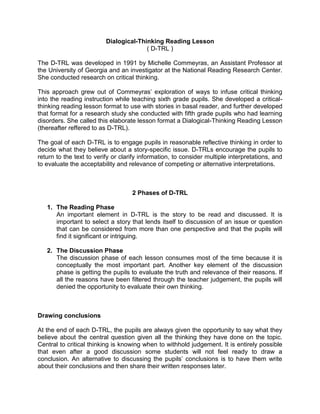
Thinking reading lesson- evelyn s. dela cruz
- 1. Dialogical-Thinking Reading Lesson ( D-TRL ) The D-TRL was developed in 1991 by Michelle Commeyras, an Assistant Professor at the University of Georgia and an investigator at the National Reading Research Center. She conducted research on critical thinking. This approach grew out of Commeyras’ exploration of ways to infuse critical thinking into the reading instruction while teaching sixth grade pupils. She developed a critical- thinking reading lesson format to use with stories in basal reader, and further developed that format for a research study she conducted with fifth grade pupils who had learning disorders. She called this elaborate lesson format a Dialogical-Thinking Reading Lesson (thereafter reffered to as D-TRL). The goal of each D-TRL is to engage pupils in reasonable reflective thinking in order to decide what they believe about a story-specific issue. D-TRLs encourage the pupils to return to the text to verify or clarify information, to consider multiple interpretations, and to evaluate the acceptability and relevance of competing or alternative interpretations. 2 Phases of D-TRL 1. The Reading Phase An important element in D-TRL is the story to be read and discussed. It is important to select a story that lends itself to discussion of an issue or question that can be considered from more than one perspective and that the pupils will find it significant or intriguing. 2. The Discussion Phase The discussion phase of each lesson consumes most of the time because it is conceptually the most important part. Another key element of the discussion phase is getting the pupils to evaluate the truth and relevance of their reasons. If all the reasons have been filtered through the teacher judgement, the pupils will denied the opportunity to evaluate their own thinking. Drawing conclusions At the end of each D-TRL, the pupils are always given the opportunity to say what they believe about the central question given all the thinking they have done on the topic. Central to critical thinking is knowing when to withhold judgement. It is entirely possible that even after a good discussion some students will not feel ready to draw a conclusion. An alternative to discussing the pupils’ conclusions is to have them write about their conclusions and then share their written responses later.
- 2. The ultimate goal of D-TRLs should be for the pupils to engage in thoughtful and in depth discussions of their reading without the teacher serving as discussion leader. Instead, the teacher might participate as an equal partner or to be free to work with another group of pupils. Diagnosis in Reading Diagnostic procedures begin with a study of the children’s instructional needs based on the expectancies of their chronological age, mental age, and grade placement. The teacher seeks to discover why a pupils read as they do, what they can read, and what the do read successfully. The teacher needs to know if the pupils are having problems in reading and, if so, what they are and what are their causes. The teacher wishes to know the pupil’s general abilities and their reading development. In short, the teacher needs to know the strengths and weaknesses of the pupils. Diagnosis is a logical process based on a consideration of all the available data concerning a particular individual or group of individuals. The analysis of these data and their interpretation in the light of knowledge gained from past experience enables the teacher to suggest necessary developmental or remedial measures. Principle of Diagnosis A diagnosis is always directed toward formulating methods of improvement. A diagnosis involves far more than appraisal of reading skills and abilities. A diagnosis must be efficient – going as far as and no further than necessary. Only pertinent information should be collected and by the most efficient means. Whenever possible, standardized test procedures should be used. Informal procedures may be required when it is necessary to expand a diagnosis. A diagnosis should be continuous. Steps in Diagnosis 1. Secure as much information as possible about the pupil and record them on a case history bank. 2. Obtain the most accurate measure possible of the level at which the child should be able to read. 3. Administer a standardized reading survey test. 4. Analyze the data to determine whether the child has a reading problem.
- 3. 5. A detailed analysis of the child’s reading problem is made. 6. Collate all the data secured and interpret the results as accurately as possible. 7. An attempt is made to identify the factors which may be inhibiting reading progress. 8. Make appropriate recommendations for remedial therapy.
- 4. Reference Galero-Tejero, Erlinda Teaching Reading in the Elementary Grades
- 5. Republic of the Philippines Bulacan Agricultural State Collge Pinaod, San Ildefonso Bulacan Written Report In partial fulfilment of the course Bachelor in Elementary Education In the subject Remedial Instruction in English Reporter: Evelyn S. Dela Cruz Professor: Dr. Alicia San Pedro Gomez
